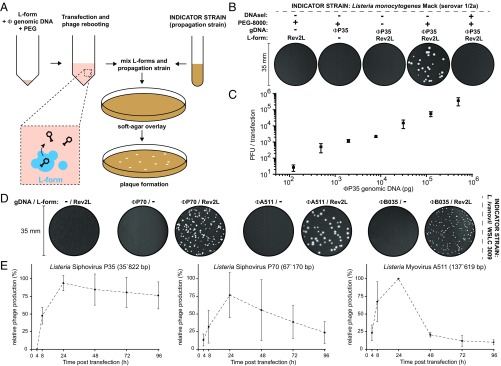Engineered bacteriophages present highly effective instruments for biotechnology, diagnostics, pathogen management, and remedy.
However, present methods for phage modifying are experimentally difficult and restricted to few phages and host organisms. Viruses that focus on Gram-positive micro organism are notably troublesome to change.
Here, we current a platform know-how that permits speedy, correct, and selection-free development of synthetic, tailored phages that infect Gram-positive micro organism. To this finish, custom-designed, synthetic phage genomes had been assembled in vitro from smaller DNA fragments.
We present that replicating, cell wall-deficient Listeria monocytogenes L-form micro organism can reboot synthetic phage genomes upon transfection, i.e., produce virus particles from bare, synthetic DNA.
Surprisingly, Listeria L-form cells not solely help rebooting of native and synthetic Listeria phage genomes but additionally allow cross-genus reactivation of Bacillus and Staphylococcus phages from their DNA, thereby broadening the method to phages that infect different necessary Gram-positive pathogens. We then used this platform to generate virulent phages by focused modification of temperate phage genomes and demonstrated their superior killing efficacy.
These synthetic, virulent phages had been additional armed by incorporation of enzybiotics into their genomes as a genetic payload, which allowed focusing on of phage-resistant bystander cells. In conclusion, this simple and strong synthetic biology method redefines the probabilities for the event of improved and fully new phage purposes, together with phage remedy.

Isolation and Characterization of a Lytic Bacteriophage (vB_PmiS-TH) and Its Application in Combination with Ampicillin towards Planktonic and Biofilm Forms of Proteus mirabilis Isolated from Urinary Tract Infection.
Proteus mirabilis is one of the commonest causes of urinary tract an infection (UTI), notably in sufferers present process long-term catheterization. Phage vB_PmiS-TH was remoted from wastewater with excessive lytic exercise towards P. mirabilis (TH) remoted from UTI.
The phage had speedy adsorption, a big burst measurement (∼260 PFU per contaminated cell), and excessive stability at a variety of temperatures and pH values. As analyzed by transmission electron microscopy, phage vB_PmiS-TH had an icosahedral head of ∼87 × 62 nm with a noncontractile tail about 137 nm in size and 11 nm in width. It belongs to the household Siphoviridae.
Combination of the phage vB_PmiS-TH with ampicillin had a better elimination exercise towards planktonic cells of P. mirabilis (TH) than the phage or the antibiotic alone. Combination of the phage at a multiplicity of an infection of 100 with a excessive dose of ampicillin (246 µg/mL) confirmed the very best biofilm elimination exercise after 24 h. This examine demonstrates that utilizing a mix of phage and antibiotic might be considerably more practical towards planktonic and biofilm kinds of P. mirabilis (TH).
